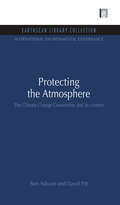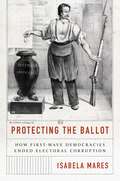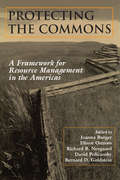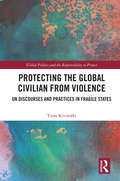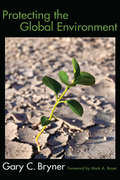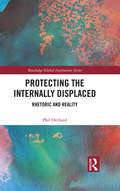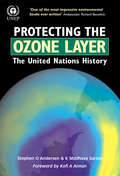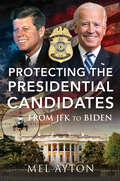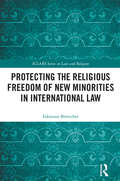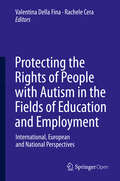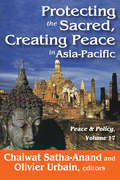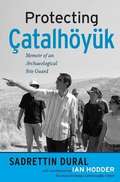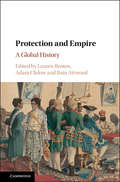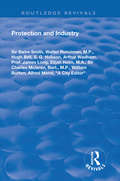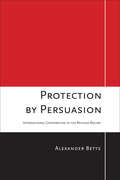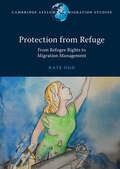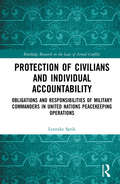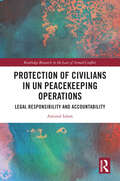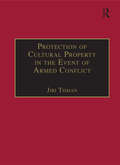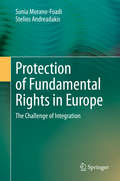- Table View
- List View
Protecting the Atmosphere: The Climate Change Convention and its context (International Environmental Governance Set)
by Sten Nilsson David Pitt'The authors take us into less-known corridors of climate Realpolitik and energy power play. We are provided with the essential vocabulary to understand what is at stake and how the challenge should be tackled' Prince Sadruddin Aga Khan Global warming and the resulting climate change present one of the greatest potential threats humanity has had to face. Every country contributes to them and they affect every person. Correspondingly, the Framework Convention on Climate Change, negotiated at the Earth Summit and since, is potentially one of the most significant international agreements ever reached � and its successful implementation is vital if the threat is to be averted. This book provides a guide to the Convention and explains in very clear terms what is involved: the background which makes it so necessary; the tortuous process involved in negotiating it; what it says; and most importantly, how it must be interpreted and implemented, making clear the scale of the changes involved and the dangers of evading them. Sten Nilsson is leader of the forest resources project at the International Institute for Applied Systems Analysis. David Pitt is a consultant to the Bellerive Foundation and Alp Action. They are the authors of Mountain World in Danger, published by Earthscan in 1991. Originally published in 1994
Protecting the Ballot: How First-Wave Democracies Ended Electoral Corruption
by Isabela MaresHow reforms limiting electoral misconduct completed the process of democratizationBetween 1850 and 1918, many first-wave democracies in Europe adopted electoral reforms that reduced the incidence of electoral malfeasance. Drawing on analysis of parliamentary deliberations and roll-call votes in France, Germany, Belgium, and the United Kingdom, Protecting the Ballot explores how these electoral changes came about.Reforms limiting electoral malfeasance came in a variety of forms. Some reforms imposed harsher punishments for bribing or the politicization of state resources during campaigns. Other changes improved electoral secrecy, providing better protection of voters’ autonomy. By mandating the presence of candidate representatives supervising electoral operations, reforms also reduced the incidence of electoral fraud. Isabela Mares documents how elite splits facilitated the formation of parliamentary majorities in support of electoral reforms. The political composition of these majorities varied across countries and across issue area, depending on the distribution of political resources and the economic and electoral costs incurred by politicians with opportunities to engage in malfeasance. Unpacking the electoral determinants of the demand for reforms, Mares offers an alternative to theories of democratization that emphasize economic considerations alone.By studying the successful adoption of reforms limiting electoral irregularities in first-wave democratic transitions, Protecting the Ballot sheds light on the opportunities and obstacles for ending electoral wrongdoing in recent democracies.
Protecting the Commons: A Framework For Resource Management In The Americas
by Joanna Burger Elinor Ostrom Bernard D. Goldstein David Policansky Richard NorgaardCommons -- lands, waters, and resources that are not legally owned and controlled by a single private entity, such as ocean and coastal areas, the atmosphere, public lands, freshwater aquifers, and migratory species -- are an increasingly contentious issue in resource management and international affairs.Protecting the Commons provides an important analytical framework for understanding commons issues and for designing policies to deal with them. The product of a symposium convened by the Scientific Committee on Problems of the Environment (SCOPE) to mark the 30th anniversary of Garrett Hardin's seminal essay "The Tragedy of the Commons" the book brings together leading scholars and researchers on commons issues to offer both conceptual background and analysis of the evolving scientific understanding on commons resources. The book: gives a concise update on commons use and scholarship offers eleven case studies of commons, examined through the lens provided by leading commons theorist Elinor Ostrom provides a review of tools such as Geographic Information Systems that are useful for decision-making examines environmental justice issues relevant to commons .Contributors include Alpina Begossi, William Blomquist, Joanna Burger, Tim Clark, Clark Gibson, Michael Gelobter, Michael Gochfeld, Bonnie McCay, Pamela Matson, Richard Norgaard, Elinor Ostrom, David Policansky, Jeffrey Richey, Jose Sarukhan, and Edella Schlager.Protecting the Commons represents a landmark study of commons issues that offers analysis and background from economic, legal, social, political, geological, and biological perspectives. It will be essential reading for anyone concerned with commons and commons resources, including students and scholars of environmental policy and economics, public health, international affairs, and related fields.
Protecting the Frontline in Biodefense Research: The Special Immunizations Program
by National Research Council of the National AcademiesThe U.S. Army's Special Immunizations Program is an important component of an overall biosafety program for laboratory workers at risk of exposure to hazardous pathogens. The program provides immunizations to scientists, laboratory technicians and other support staff who work with certain hazardous pathogens and toxins. Although first established to serve military personnel, the program was expanded through a cost-sharing agreement in 2004 to include other government and civilian workers, reflecting the expansion in biodefense research in recent years. Protecting the Frontline in Biodefense Research examines issues related to the expansion of the Special Immunizations Program, considering the regulatory frameworks under which the vaccines are administered, how additional vaccines might be considered for inclusion in the Program, and factors that might influence the development and manufacturing of vaccines for the Special Immunizations Program.
Protecting the Global Civilian from Violence: UN Discourses and Practices in Fragile States (Global Politics and the Responsibility to Protect)
by Timo KivimäkiThis book reveals why the UN is more successful than unilateral great powers in protecting civilians from violence, and focuses on the discourse, development and consequences of UN peacekeeping. Analysing statistics of state fragility and fatalities of violence, it reveals that the UN has managed to save tens of thousands of lives with its peacekeeping: a surprising statistic given the media consensus about the UN’s powerlessness and inefficiency. Using computer-assisted discourse analysis of resolutions from the UN Security Council, 1993-2019, the book offers data that describe the character and development of UN approach to the protection of civilians from violence. It then links the data to the statistics of conflict fatalities and state fragility to reveal, by means of qualitative and quantitative analysis, when, where, how and why the UN has been successful at protecting civilians. Two reasons for the UN’s success are highlighted in the book as being statistically most significant. First, the organization offers local ownership to peaceful solutions by considering conflicting parties as the primary agents of protection. Second, the UN approach is much less power-oriented than unilateral approaches by the great powers: protection for the UN does not mean deterrence or destruction, but rather, support for local protectors of civilians. However, strong great power influence on such operations tends to weaken UN’s ability to save lives. This book will be of much interest to students of humanitarian intervention, peacekeeping, human rights and International Relations in general.
Protecting the Global Environment
by Gary C Bryner" Gary Bryner's brief, readable, capstone book: " Features a forward by Mark A. Boyer Outlines the major environmental challenges facing the world today Applies international relations theory to these challenges Covers such key topics as development, sustainability, and market capitalism Offers a social justice perspective to environmental problems and solutions Borne of an amalgam of social science, fieldwork, and a passionate commitment to justice, this book brings debates about climate change to a new level, compelling readers and researchers to rethink the reasons for reversing global environmental trends. The book lays out three inspirations for improving environmental prospects: effective markets, sustainable development, and environmental justice for the most vulnerable. It also projects three possible scenarios flowing from the success or failure of these inspirations one bleak, one breakthrough, and one of status quo. Gary Bryner is not sanguine about humanity s ability to make the right choices, but this does not deter him from asking us to think beyond our own generation and our own species in urging environmental action now."
Protecting the Individual from International Authority
by Michael Zürn Monika HeupelInternational organizations (IOs) develop institutional provisions to make sure that their policies do not violate human rights. Accordingly, whilst IOs have a greater scope of action and ability to promote collective goods than ever before, they also have a greater capacity to do harm. Based on ten case studies on UN and EU sanctions policy, UN and NATO peacekeeping, and World Bank and IMF lending, this book examines human rights violations which can arise from the actions of IOs rather than those of states. It further explains how powerful IOs have introduced human rights protection provisions and analyzes the features of these provisions, including differences in their design and quality. This book provides evidence of a novel legitimation strategy authoritative IOs draw on that has, as yet, never been systematically studied before.
Protecting the Internally Displaced: Rhetoric and Reality (Global Institutions)
by Phil OrchardToday, there are over 40 million conflict-induced internally displaced persons (IDPs) globally, almost double the number of refugees. Yet, IDPs are protected only by the soft-law Guiding Principles on Internal Displacement at the global level. Instead of a dedicated international organization, IDPs receive protection and assistance only through the UN’s cluster approach. Orchard argues that while an international IDP protection regime exists, many aspects of it are informal, with IDP issues bound up in a humanitarian regime complex that divides the mandates of key organizations and even the question of IDP status itself. While the Guiding Principles mark an important step forward, implementation of laws and policies based on them at the domestic level remains haphazard. Action at the international level similarly reflects an all-too-often ad hoc approach to IDP issues. Through an in-depth examination of IDP efforts at the international level and across the forty states which have adopted IDP laws and policies, Orchard argues that while progress has been made, new and greater monitoring and accountability mechanisms at both the domestic and international levels are critical. This work will be valuable to scholars, students, and practitioners of forced migration, international relations theory, and the Responsibility to Protect doctrine.
Protecting the Ozone Layer: The United Nations History
by Stephen O Andersen K Madhava SarmaIn the 1970s the world became aware of a huge danger: the destruction of the stratospheric ozone layer by CFCs escaping into the atmosphere, and the damage this could do to human health and the food chain. So great was the threat that by 1987 the UN had succeeded in coordinating an international treaty to phase out emissions; which, over the following 15 years has been implemented. It has been hailed as an outstanding success. It needed the participation of all the parties: governments, industry, scientists, campaigners, NGOs and the media, and is a model for future treaties. This volume provides the authoritative and comprehensive history of the whole process from the earliest warning signs to the present. It is an invaluable record for all those involved and a necessary reference for future negotiations to a wide range of scholars, students and professionals.
Protecting the Presidential Candidates: From JFK To Biden
by Mel AytonProtecting the Presidential Candidates is the first book of its kind to examine how presidents and presidential candidates were protected during the presidential election cycles – from JFK to Biden. It is also the first book of its kind to tell the story of the role of state troopers and private bodyguards in protecting presidential candidates. Protection for candidates changed and evolved from the free-wheeling style of the 1950s and early 1960s, which afforded presidential candidates little or no protection, to the growth of bodyguard personnel, increased intelligence facilities and state of the art technology employed today to keep the candidates safe. Presidential candidates relish connecting with the public and it has given greater visibility to the bodyguards who are willing to place themselves between a presidential candidate and a would-be attacker. In the milieu in which the Secret Service operates, bodyguards have witnessed the terrors of election campaigns when presidential candidates have waded into crowds to shake hands with their supporters, rode in open-top cars, and made sudden but risky changes to their schedules – oblivious to the fact that in every campaign there have been people stalking candidates with ill intent. Many stories revealed in Protecting the Presidential Candidates have remained largely hidden from the public; some buried in newspaper archives and others in oral histories, presidential libraries or official government documents. The author draws on numerous sources, including FBI files, presidential biographies, vice presidential biographies, civilian bodyguard memoirs, Secret Service agent memoirs, White House staff memoirs and more so that these stories can now be told. The book also allows readers to gain an insight into the personal as well as professional relationships between the candidate and the bodyguards who protected them. Some candidates were so trusting of their bodyguards they embraced them as part of an ‘inner circle’ of advisers. Bodyguards have also witnessed embarrassing moments in a candidate’s campaign and how intrusive they have been at the most delicate of moments. "The president’s day is your day," one agent said. "Nobody sees the president the way an agent does."
Protecting the Religious Freedom of New Minorities in International Law (ICLARS Series on Law and Religion)
by Fabienne BretscherThis book examines the interpretation and application of the right to freedom of religion and belief of new minorities formed by recent migration by the European Court of Human Rights (ECtHR) and the United Nations Human Rights Committee (HRC). New minorities are increasingly confronted with restrictions of their religious practices and have addressed their rights claims both to the ECtHR and the HRC through their individual complaint procedures, which resulted in several contradicting decisions. Based on a quantitative and qualitative empirical analysis of the relevant case law, focusing in particular on the reasoning adopted by the two bodies, this book finds that the HRC in its practice offers a significantly higher level of protection to new minorities than the ECtHR. Such divergence may be explained by various institutional and conceptual differences, of which the concept of the margin of appreciation is the most influential. It is contended that the extensive use of the concept of the margin of appreciation by the ECtHR in the case law regarding new minorities’ right to freedom of religion and belief, and the absence of such concept in the HRC’s case law, could be explained by different understandings of the role of an international human rights body in conflicts between the majority and minorities. This book argues that such divergence could be mitigated with various tools, such as the inclusion of cross-references to the case law of other relevant bodies as well as to instruments specifically established for the protection of minorities. The book will be of interest to academics, researchers and practitioners in the area of international human rights law, international public law in general and law and religion.
Protecting the Rights of People with Autism in the Fields of Education and Employment
by Valentina Della Fina Rachele CeraFundamental rights for all people with disabilities, education and employment are key for the inclusion of people with autism. They play as facilitators for the social inclusion of persons with autism and as multipliers for their enjoyment of other fundamental rights. After outlining the international and European dimensions of the legal protection of the rights to education and employment of people with autism, the book provides an in-depth analysis of domestic legislative, judicial and administrative practice of the EU Member States in these fields. Each chapter identifies the good practices on inclusive education and employment of people with autism consistent with principles and obligations enshrined in the UN Convention on the Rights of Persons with Disabilities (Articles 24 and 27). The book contains the scientific results of the European Project "Promoting equal rights of people with autism in the field of employment and education" aimed at supporting the implementation of the UN Convention in the fields of inclusive education and employment.
Protecting the Sacred, Creating Peace in Asia-Pacific (Peace And Policy Ser.)
by Chaiwat Satha-Anand Olivier UrbainUsing case studies from the Middle East, South Asia, Southeast Asia, and the Pacific Basin, this book examines the global trend of violence against religious places and figures. The contributors believe attacks on sacred places to be particularly damaging to peace and harmony because of the centrality of religion in many Asian and Pacific countries.A diverse range of topics are covered, including an empirical exploration of the global trends of violence against sacred spaces; attacks against and policies toward holy sites in Israel and the Palestinian Territories; the fate of Indian Islamic monuments after India gained independence in 1947; the Christian community's response to the increasing Islamization of Malaysia, and the future of communalism in Malaysia. Africa and Australia are also referenced in the work.Taken together, this volume explores the importance of protecting sacred spaces, holy symbols, and religious people as a crucial element in fostering peace in the world, and especially the Asia-Pacific region. The contributors argue that much of the violence in the world is rooted in politics of religious identity.
Protecting the Vulnerable: A Reanalysis of Our Social Responsibilities
by Robert E. GoodinIn this book, Robert E. Goodin speaks on our special responsibilities toward our families, friends, clients, compatriots, etc., that are relatively strong moral claims with restricted scope. He adds, vulnerability of the beneficiary rather than any voluntary commitment per se on the part of the benefactor which generates these special responsibilities and we should always strive to protect the vulnerable.
Protecting Çatalhöyük: Memoir of an Archaeological Site Guard
by Sadrettin Dural Ian HodderThey are essential to every major archaeological excavation but rarely acknowledged by the visiting researchers once the artifacts have been shipped. As part of the innovative, multivocal output from the famous Turkish Neolithic site of Çatalhöyük, we hear from one of the site guards, Sadrettin Dural, who tells the story of the excavation from the point of view of the 'Other'. He offers tales of the strange habits of archaeologists, describes the local in-fighting that scholars never see, and explains how scientists can be protected from the Yatirs, spirits of the dead who guard the mound. Ian Hodder, director of the Çatalhöyük project, provides explanatory notes for the reader and an interview with the author, exploring indigenous interpretations of ancient sites and the archaeologists who excavate them. For the archaeologist, this offers a revolutionary new viewpoint on their work. For the cultural anthropologist, Dural's role as site guard is only a small part of his life as a Turkish villager. The author recounts the daily lived experience of one man in a contemporary Turkish village, including changing economic strategies for supporting his family, brushes with the law, trips to the beach and the city, and Turkish phone sex.
Protection Amid Chaos: The Creation of Property Rights in Palestinian Refugee Camps (Columbia Studies in Middle East Politics)
by Nadya HajjThe right to own property is something we generally take for granted. For refugees living in camps, in some cases for as long as generations, the link between citizenship and property ownership becomes strained. How do refugees protect these assets and preserve communal ties? How do they maintain a sense of identity and belonging within chaotic settings?Protection Amid Chaos follows people as they develop binding claims on assets and resources in challenging political and economic spaces. Focusing on Palestinians living in refugee camps in Lebanon and Jordan, it shows how the first to arrive developed flexible though legitimate property rights claims based on legal knowledge retained from their homeland, subsequently adapted to the restrictions of refugee life. As camps increased in complexity, refugees merged their informal institutions with the formal rules of political outsiders, devising a broader, stronger system for protecting their assets and culture from predation and state incorporation. For this book, Nadya Hajj conducted interviews with two hundred refugees. She consults memoirs, legal documents, and findings in the United Nations Relief Works Agency archives. Her work reveals the strategies Palestinian refugees have used to navigate their precarious conditions while under continuous assault and situates their struggle within the larger context of communities living in transitional spaces.
Protection and Empire: A Global History
by Lauren Benton Adam Clulow Bain Attwood"For five centuries protection has provided a basic currency for organising relations between polities. Protection underpinned sprawling tributary systems, permeated networks of long-distance trade, reinforced claims of royal authority in distant colonies and structured treaties. Empires made routine use of protection as they extended their influence, projecting authority over old and new subjects, forcing weaker parties to pay them for safe conduct and, sometimes, paying for it themselves. The result was a fluid politics that absorbed both the powerful and the weak while giving rise to institutions and jurisdictional arrangements with broad geographic scope and influence. This volume brings together leading scholars to trace the long history of protection across empires in Asia, Africa, Australasia, Europe and the Americas. Employing a global lens, it offers an innovative way of understanding the formation and growth of empires and uncovers new dimensions of the relation of empires to regional and global order"--
Protection and Industry (Routledge Revivals)
by William Burton Swire Sir Smith Walter M.P. Runciman Hugh Bell S.G. Hobson Arthur Wadham James Prof. Long Elijah M.A. Helm Charles Sir McLaren M.P Bart. Alfred Mond "A City Editor"First published in 1904, this volume emerged during a split within the Liberal Unionist Party over Joseph Chamberlain’s advocacy of Protectionism through Tariff Reform. Having originally broken with the Liberal Party over Home Rule in 1885, 1904 saw some Liberal Unionists return to the Liberal fold. The authors here constitute those departing Liberal Unionists in a multifaceted rallying call for Free Trade in the face of Protectionism. Their articles, on subjects such as Shipping, Agriculture and Engineering, assess the implications of Free Trade with a focus on each author’s specialist industry. The authors unanimously declare in favour of the system under which, they maintain, Great Britain developed unparalleled prosperity and taught other nations her industrial success. In the process, they demonstrate that trade cannot improve whilst fettered and focus on the potential for real improvements through Free Trade.
Protection by Persuasion: International Cooperation in the Refugee Regime
by Alexander BettsStates located near crisis zones are most likely to see an influx of people fleeing from manmade disasters; African states, for instance, are forced to accommodate and adjust to refugees more often than do European states far away from sites of upheaval. Geography dictates that states least able to pay the costs associated with refugees are those most likely to have them cross their borders. Therefore, refugee protection has historically been characterized by a North-South impasse. While Southern states have had to open their borders to refugees fleeing conflict or human rights abuses in neighboring states, Northern states have had little obligation or incentive to contribute to protecting refugees in the South.In recent years, however, the Office of the United Nations High Commissioner for Refugees (UNHCR) has sought to foster greater international cooperation within the global refugee regime through special conferences at which Northern states are pushed to contribute to the costs of protection for refugees in the South. These initiatives, Alexander Betts finds in Protection by Persuasion, can overcome the North-South impasse and lead to significant cooperation. Betts shows that Northern states will contribute to such efforts when they recognize a substantive relationship between refugee protection in the South and their own interests in such issues as security, immigration, and trade. Highlighting the mechanisms through which UNHCR has been able to persuade Northern states that such links exist, Protection by Persuasion makes clear that refugee protection is a global concern, most effectively addressed when geographic realities are overridden by the perception of interdependence.
Protection from Refuge: From Refugee Rights to Migration Management (Cambridge Asylum and Migration Studies)
by Kate OggThe places in which refugees seek sanctuary are often as dangerous and bleak as the conditions they fled. In response, many travel within and across borders in search of safety. As part of these journeys, refugees are increasingly turning to courts to ask for protection, not from persecution in their homeland, but from a place of 'refuge'. This book is the first global and comparative study of 'protection from refuge' litigation, examining whether courts facilitate or hamper refugee journeys with a particular focus on gender. Drawing on jurisprudence from Africa, Europe, North America and Oceania, Kate Ogg shows that courts have transitioned from adopting robust ideas of refuge to rudimentary ones. This trajectory indicates that courts can play a powerful role in creating more just and equitable refugee protection policies, but have, ultimately, compounded the difficulties inherent in finding sanctuary, perpetuating global inequities in refugee responsibility and rendering refuge elusive.
Protection of Civilians and Individual Accountability: Obligations and Responsibilities of Military Commanders in United Nations Peacekeeping Operations (Routledge Research in the Law of Armed Conflict)
by Lenneke SprikThis book explores the question of whether peacekeeping commanders can be held accountable for a failure to protect the civilian population in the mission area. This requires an assessment of whether peacekeeping commanders have an obligation to act against such serious crimes being committed under domestic and international law. The work uses the cases of the Dutch and Belgian peacekeeping commanders in Srebrenica and Kigali as examples, but it also places the analysis into the context of contemporary peacekeeping operations. It unfolds two main arguments. First, it provides a critical note to the contextual interpretation given to international law in relation to peacekeeping. It is argued that establishing a specific paradigm for peacekeeping operations with clear rules of interpretation and benchmark criteria would benefit peacekeeping and international law by making the contextual interpretation of international law redundant. Second, it is held that alternative options to the existing forms of criminal responsibility for military commanders should be considered, possibly focusing more clearly on failing to fulfil a norm of protection that is specific to peacekeeping and distinct from protective obligations under international human rights law and international humanitarian law.
Protection of Civilians in UN Peacekeeping Operations: Legal Responsibility and Accountability (Routledge Research in the Law of Armed Conflict)
by Aminul IslamThis book discusses the legal responsibility of UN peacekeepers for the protection of civilians under international legal regimes, particularly international human rights law, international humanitarian law, international refugee law, and occupation law. It considers both negative and positive obligations, that is, a duty to respect or not violate a particular right directly and a duty to take positive action to secure or protect a particular right, respectively. In addition, it describes the standards and methods, as well as their strengths and weaknesses, by which actors in UN peacekeeping operations, including the UN, troop contributing countries, and individual peacekeepers, can be held accountable for third-party claims and allegations of criminal misconduct against UN peacekeepers for violations of responsibility in peacekeeping operations. The work will be a valuable resource for academics, researchers, and policy-makers working in the areas of International Law, International Humanitarian Law, International Human Rights Law, and International Relations.
Protection of Cultural Property in the Event of Armed Conflict (In Association with UNESCO)
by Jiri TomanAt the request of UNESCO, Jiri Toman, Acting Director of the Henry Dunant Institute in Geneva has written this detailed analysis of the 1954 Hague Convention for the Protection of Cultural Property in the Event of Armed Conflict - still the only universal legal instrument in this field. The author has used the materials that emerged from the preparatory work for the Convention and has taken numerous examples from UNESCO’s records about the application of the Convention in conflicts over the last 40 years to illustrate this article-by-article commentary on the Convention itself, the Regulations for its Execution, and its Protocol. The author establishes parallels with other international legal instruments such as the 1977 Protocols Additional to the 1949 Geneva Conventions or the other UNESCO conventions relating to cultural heritage and puts forward ideas for a more general study of the protection of cultural property in the event of armed conflict and the legal and practical ways of achieving this. This work should satisfy the expectations of politicians and those responsible for culture in the countries that are States Parties to the Convention, now numbering more than 80, and of those that are considering becoming parties to it, given the increasing calls being made for the international community to have greater powers to defend the cultural heritage from attacks to which it is too often exposed in armed conflicts today.
Protection of Fundamental Rights in Europe: The Challenge of Integration
by Sonia Morano-Foadi Stelios AndreadakisThis monograph offers a longitudinal analysis of the developments in the European fundamental rights arena during the last decade. Decisions of critical importance on the future of the EU need to be taken by the EU institutions and the Member States' governments. The ‘existential’ crisis affecting Europe is essentially a crisis of values revealing a lack of shared vision. Based on this premise, this monograph contributes to the debate on how to overcome the current impasse. By situating the analysis of the EU in the context of a wider Europe, which includes the ECHR (and its interpretation by the ECtHR), this work challenges the idea that the project of European integration should be abandoned. Instead it proposes a re-orientation of this process, conceptualised as a dynamic interaction of different actors, sources and laws on fundamental rights within the wider Europe. Following an evaluation of the current fundamental rights’ regimes, the monograph proposes a model of effective governance of fundamental rights in Europe based on the doctrines of dialogical constitutionalism and agency. This original and innovative contribution is enriched by findings from British Academy funded research on the European architecture of fundamental rights post-Lisbon Treaty.
Protection of Global Biodiversity: Converging Strategies
by Jeffrey Mcneely Lakshman D. GuruswamyThe rate of extinction of biological species is greater today than at any time in the last 65 million years. Some predict that if this rate continues, two-thirds of all living species will disappear during the next century. Because reaching consensus on specific courses of action involves complex issues, any adequate response to this impending crisis must include coverage of many areas of inquiry and understanding. Protection of Global Biodiversity features essays by distinguished international experts who communicate with each other across disciplinary boundaries to address the challenge of formulating policies to protect biodiversity.Although the global community has recently adopted a Convention of Biological Diversity, the agreement sets forth only abstract goals. Contributors to this volume advance the Convention's initial steps by providing workable solutions that can be implemented regionally, nationally, and locally. The contributors--including natural, social, and political scientists; economists; lawyers; and environmentalists; and decisionmakers in business, agriculture, and government--have united to create a common discourse and to evaluate and propose strategies for halting this alarming loss of biodiversity. In recognizing the diverse aspects of this task--scientific, economic, institutional, moral, and legal--this book presents a new picture of emerging action.Contributors. S. James Anaya, Gregory Benford, Graciela Chichilnisky, S. Todd Crider, Yvonne Cripps, Robert T. Fraley, Anil K. Gupta, Lakshman D. Guruswamy, G. M. Heal, Brent Hendricks, Robert B. Horsch, Laura L. Jackson, Annie Lovejoy, Ariel E. Lugo, Jeffrey A. McNeely, Brian G. Norton, Elinor Ostrom, Peter H. Raven, John W. Reid, Walter V. Reid, Mark Sagoff, Roger A. Sedgo, R. David Simpson, Ana Sittenfeld, Christopher D. Stone, Gary H. Toenniessen
